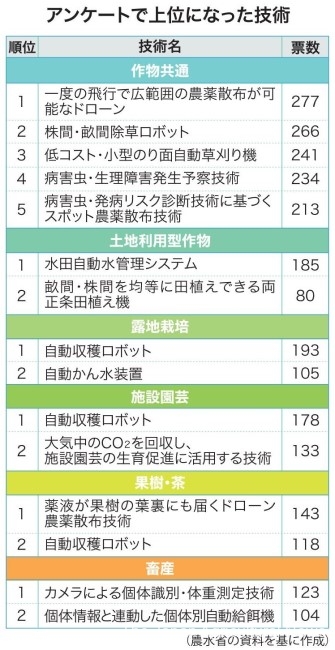Wide-area chemical-spraying drones top the list of in-demand smart farming technologies
TOKYO, Dec. 19 – The most demanded smart agricultural technology by farmers is a drone that can spray agrichemicals over a wide area, according to a survey recently conducted by the agriculture ministry to grasp technological needs.
Other technologies high on the list include labor-saving machinery such as weeding robots and automatic mowers, as well as fruit and vegetable harvesting robots.
The ministry plans to prioritize research and development of high-demand technologies in the future.
The survey was conducted between Nov. 22 and Dec. 5 on the ministry’s website and garnered responses from 1,095 people including farmers, local government officials and researchers.
Each respondent was asked to choose up to five technologies which he or she thinks needs to be improved or newly developed out of 58 options.
As a result, 277 chose chemical-spraying drones to make the device the most in-demand technology. The ministry sees a strong need for improvement in the technology as currently available drones can spray chemicals only over narrow areas because of their limited battery and chemical loading capacity.
Robots that weed rice paddies between ridges and between rice plants came second, followed by low-cost, small-sized autonomous mowers that can be used on slopes.
Ministry officials pointed out that demands were higher for labor-saving technologies compared with technologies that help improve yields and the quality of farm produce.
“There must be many management entities that hope to first solve labor shortage,” said an official of the ministry’s research promotion division.
The survey also asked what kind of technologies are needed according to the types of cultivation.
Automatic cultivating robots topped the list of technologies needed in open field cultivation and greenhouse horticulture. The robots came second in fruits and tea cultivation.
The technology gained support particularly from people growing heavier vegetables such as cabbages and onions in the open field.
“They must be asking (for a technology) to reduce the burden of carrying heavy containers and bending over,” the official said.
It was the first time for the ministry to conduct a survey asking for opinions of farmers on smart agricultural technology.
Research and development of the technologies in high demand will be adopted on a preferential basis as projects entrusted by the government. The ministry hopes the results of the questionnaire will also be used as a reference by manufacturing firms and researchers.
Source: http://english.agrinews.co.jp/?p=10367

